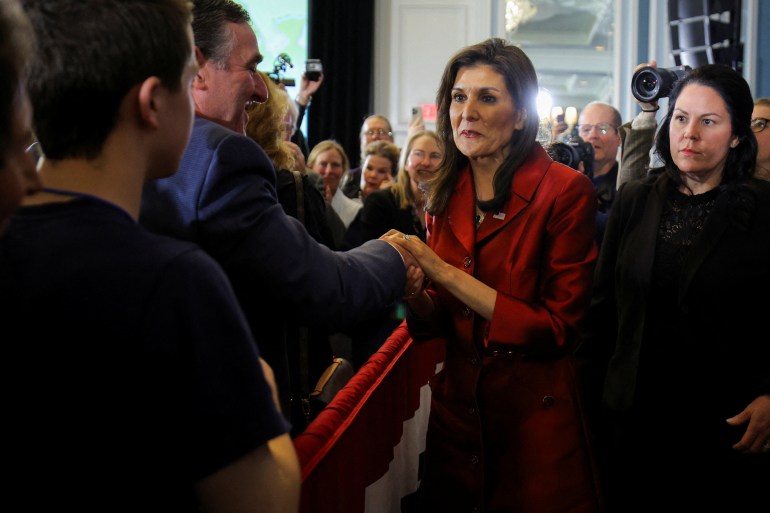But rival Nikki Haley says she is not dropping out of the United States presidential race. Despite her loss in a state where she previously won two terms as governor, Haley said she will stay in the race until at least the Super Tuesday primaries on March 5.
Let’s unpack the primary vote and what it means for the two candidates.
How did Trump win in South Carolina?
Trump’s victory in South Carolina looked remarkably similar to his wins in the Iowa caucuses and the New Hampshire primary. It’s a sign that regional differences that once existed within the GOP have been supplanted by a national movement that largely revolves around the former president.
Trump, 77, won in South Carolina with voters who are white and do not have a college degree, one of his core constituencies. About two-thirds of Trump’s backers in this election fell into that group.
A majority believe Trump is a candidate who can emerge victorious in November’s general election, while only about half say the same of Haley. Voters were also far more likely to view Trump than Haley as someone who would “stand up and fight for people like you” and to say he would keep the country safe. And about seven in 10 say he has the mental capability to serve effectively as president.
Trump’s voters also backed his more nationalist views – they are more likely than Haley’s supporters to have lukewarm views of the NATO alliance or even consider it bad for the US, to say immigrants are hurting the country and to say immigration is the top issue facing the country.
Why did Haley say she is still in the race?
Haley has become the voice of a portion of the Republican Party that feels rootless, those traditional-minded conservatives who backed presidential candidates such as George W Bush and Mitt Romney.
Haley is the closest thing they have now to a champion and advocate – and for now, at least, she retains a public platform to air her views.
“I’m not giving up this fight when a majority of Americans disapprove of both Donald Trump and Joe Biden,” she said on Saturday.
At the age of 52, Haley has bet that she can offer a generational change for the GOP. But the future she articulated has little basis in the present-day GOP. About four in 10 of South Carolina Republicans – including about six in 10 of those supporting Trump - say they have an unfavourable opinion of her.

Despite the result, Haley has pledged to continue her campaign.
“I said earlier this week that, no matter what happens in South Carolina, I would continue to run for president,” Haley said in a speech to supporters in the city of Charleston after her loss. “I’m a woman of my word.”
Haley insisted she would fight on at least through “Super Tuesday” on March 5, when Republicans in 15 states and one US territory will cast ballots.
The reason why she is still in the race is money, said Al Jazeera’s Shihab Rittansi, reporting from Charleston.
“Even though she has little prospect to win any of the future races, deep pocket of donors are still prepared to bankroll her because of their antipathy to Donald Trump or to keep her in the running in case Trump’s legal troubles mean he has to drop out,” Rittansi said.
The majority of South Carolina voters consider themselves supporters of the “Make America Great Again” movement, a Trump slogan that helped catapult him to the White House in 2016.
Haley’s voters were much more divided: About half were motivated by supporting her, but nearly as many turned out to oppose Trump.
What are Trump’s potential weaknesses?
Trump has an iron grip on the Republican base, but that might not be enough of a coalition to guarantee a win in November’s general election.
South Carolina was a chance to show that he can expand his coalition beyond voters who are white, older and without a college degree. But about nine in 10 of South Carolina’s primary voters were white, making it hard to see if Trump has made inroads with Black voters whom he has attempted to win over.
Haley outpaced Trump among college-educated voters, a relative weakness for him that could matter in November as people with college degrees are a growing share of the overall electorate. Even though South Carolina Republican voters believe that Trump can win in November, some had worries about his viability.
About half of Republican voters in South Carolina – including about a quarter of his supporters – are concerned that Trump is too extreme to win the general election.
About three in 10 voters believe he acted illegally in at least one of the criminal cases against him, even though about seven in 10 believe the investigations are political attempts to undermine him.
Trump dominates among conservative voters. But his challenge is that those voters were just 37 percent of the electorate in the November 2020 presidential election. The other 63 percent identified as moderate or liberal, the two categories that Trump lost to Haley in South Carolina.
